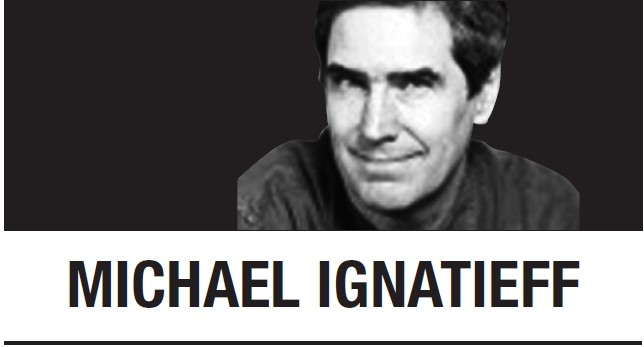
Seventy-five years ago last week, UN member states meeting in Paris adopted the Universal Declaration of Human Rights. It was not a binding law, only a statement of principle. But it was the first declaration to embed an ancient moral ideal of human equality into the new architecture of international law established in response to the genocidal nationalism that had left so much of the world in ruins after World War II.
This new moral universalism asked us to turn our backs on our instinctive partiality for members of our own tribe. It asked us to look past salient differences – race, creed, gender, class, national origin, language – and contemplate our shared humanity. But many at the time wondered whether we were capable of such a radical experiment. As Hannah Arendt observed in 1948, “It seems that a man who is nothing but a man has lost the very qualities which make it possible for other people to treat him as a fellow-man.”
The defenseless prisoners of Auschwitz-Birkenau had discovered that their claims as human beings – to pity and decency, let alone to rights – meant nothing to their tormentors. Only if such defenseless people had a state to protect them, Arendt argued, would they be safe.
Until 1989, the declaration’s utopian hopes were confined largely to the West. Former colonial peoples had never been part of the original negotiations that led to the declaration, and in the early decades of the Non-Aligned Movement, they generally resented Western criticism of their new regimes.
Meanwhile, nation-states across the Soviet empire contested the UN declaration’s legitimacy outright. The USSR and its satellites had abstained from the original vote, believing that the socialist rights they advocated were superior to the individual rights enshrined in the declaration. Only after the Berlin Wall came down in 1989 did it become possible to believe that the whole world had at last embraced moral universalism.
Of course, such optimism seems hopelessly naive today, given the situation in Ukraine, the Middle East, Sudan, Myanmar, and elsewhere.
But to blame this state of affairs on previous and current leaders may mask a larger truth: that the moral universalism of human rights asks more of most human beings than they can manage. Anyone who is not Palestinian, Jewish or Israeli ought to find moral universalism a relatively easy discipline; yet consider how the world has divided into rigid camps as the Gaza catastrophe has unfolded.
For those living through the current nightmare, exhibiting a universalist empathy seems like a non-starter. On one side, a people who live with the ancestral memory of the Holocaust cannot be expected to feel anything but dread after Hamas’s atrocities on Oct. 7. To seek revenge – or at least to re-establish deterrence with an overwhelming military response – is only too human. On the other side, a people who are descendants of refugees driven out of Mandate Palestine in 1948, and who have now been under continuous bombardment for weeks, cannot be expected to relate to any pain or fury other than their own.
If there is a lesson in all this, it is not to jettison the moral intuition that underpins human rights. Look closely and you will find that compassion and empathy are as resilient as cruelty and vengeance, even among those trapped in the cauldron of war. You will see Israeli and Palestinian moral universalists still committed to peace with justice. They are the ones who vindicate the sentiment underlying the Universal Declaration.
A remarkable feature of this catastrophic conflict, stretching back to 1948, is that there has never been a shortage of moral universalism on either side. The real problem is not the absence of empathy or compassion among those caught in the conflict. Rather, it is the presence of malignant, murderous spoilers on both sides. The fate of two leaders who did make peace – Israel’s Yitzhak Rabin, killed by a Jewish extremist; and Egypt’s Anwar el-Sadat, killed by Islamist fanatics – has been a powerful deterrent even for those who know that peace is the only viable path for their people.
Peace can still be achieved through the mutual recognition of pain and loss, but not until the spoilers on both sides – the settlers rampaging the West Bank and driving Binyamin Netanyahu’s government toward annexation and expropriation, and the jihadist militants who want nothing but to destroy Israel – are beaten.
The Universal Declaration tells us we should respect the rights of others and ensure that they are not violated. But it does not tell us how. For that, we must engage in politics, where hard choices impose themselves.
That brings us back to Arendt’s critique of moral universalism – that in the absence of a state with the authority to recognize and uphold rights, a person is “nothing but” a human being. By this logic, the two-state solution in the Middle East is the only path to peace and justice, because statehood is the only guarantor of universal human rights. Only through two states can the spoilers be defeated – and the moral universalism of the UN declaration finally win out.
Michael Ignatieff
Michael Ignatieff, professor of history and rector emeritus of Central European University in Vienna, is a former Canadian politician and author of "On Consolation: Finding Solace in Dark Times." – Ed.
(Project Syndicate)
-
Articles by Korea Herald



















![[Today’s K-pop] Treasure to publish magazine for debut anniversary](http://res.heraldm.com/phpwas/restmb_idxmake.php?idx=642&simg=/content/image/2024/07/26/20240726050551_0.jpg&u=)